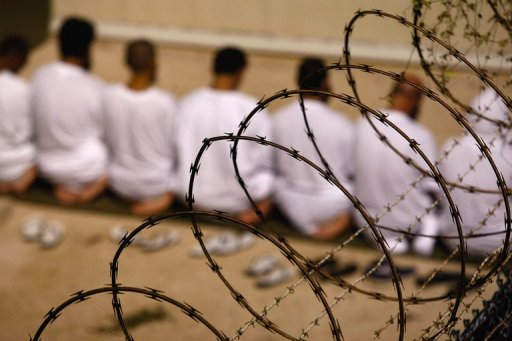
(AFP PHOTO/MOHAMED EL-SHAHED)
Twenty-one detainees held at Wadi El-Natrun prison will face prosecution on Sunday in a detention renewal session, marking their fifth day of a hunger strike.
The 21 detainees were arrested on 25 January in the backdrop of protests marking the third anniversary of the 2011 revolution. They have been held in preventative detention for over two months.
The detainees have gone on a hunger strike demanding they be released, according to a statement released by the Freedom for the Brave movement, citing journalist Karim Al-Behairy. The movement claimed that the prison administration refused to report their hunger strike. It added that the detainees include three minors who are held with adult prisoners.
Revolutionary anniversary detainees have often complained of dire detention conditions. Among the 1,079 the Ministry of Interior reported to have arrested on 25 January, at least 79 were held at Abu Zaabal Prison. They all reported being subjected to torture, according to their lawyer Mahmoud Belal, who described the prison as “inhumane” and “notorious for torture”.
On Thursday, 70 detainees from the Abu Zaabal Prison group filed a report to the prosecutor general regarding the torture they claim to have faced during their detention. Mohamed Abdel Aziz, one of the lawyers who filed the report, said that it had been referred to the Cairo Appeals Prosecution for investigation.
In the report, the detainees accused security forces of randomly arresting and taking them to Azbakeya Police Station, where they faced “cruel treatment” ranging from beating to kicking, electrocution, sexual harassment and assault. The detainees were later referred to Abu Zaabal Prison, where they faced further “brutal” torture.
After complaining to the prosecution of being subjected to torture during a detention renewal session on 9 February, Khaled Al-Sayed and three other political activists were moved from Abou Zaabal Prison to Tora Prison. The attorney general for the North Cairo Prosecution ordered their release on 4 March.
Belal had earlier said the prosecution was mostly uncooperative in reporting the detainees’ torture complaints during the 9 February session.
The four detainees were physically assaulted outside the prosecution on 23 February during another detention renewal session.
The lawyers stated in Thursday’s report that such torture practices violate Article 52 of the 2014 constitution, which lists torture “in all its forms” as a crime not subject to statute of limitations. They added that such practices also violate articles 126, 127 and 129 of the Egyptian Penal Code.
The Ministry of Interior, however, denied torture allegations reported by those who had been preventively detained. In a statement released in February, the ministry expressed its readiness to receive complaints from inmates, adding it will look into such complaints and take “decisive measures” against all those who are found complicit in committing “violations or delinquencies”.
On 15 March, the Azbakeya Misdemeanour Court handed a sentence of two years’ hard labour and an EGP 50,000 fine to 68 detainees among the Abu Zaabal group. The defendants were also sentenced to two additional years of probation, to be implemented following their release from prison.
They were accused of illegal assembly, violating the Protest Law and displaying force, among other charges. Their appeal session is on Sunday.


